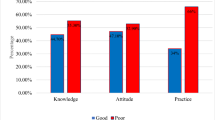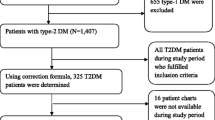Abstract
Aims
Type 2 diabetes mellitus is a common disease imposing a great economic burden to health systems. As the prevalence of type 2 diabetes in Iran has grown over the past decades, it has become necessary to evaluate the level of knowledge, attitude and practice of type 2 diabetic patients in our country for policy planning to increase the patients’ awareness of diabetes and its complications and, in the long run, decrease costs of treatment. The aim of this study was to evaluate the level of knowledge, attitude and practice of patients with diabetes and its relationship with self-managing of disease and quality of life.
Methods
This study was conducted with the aim of assessing the knowledge, attitude, self-reported practice, self-care and health-related quality of life (HRQoL) among patients attending diabetes clinic of Torfeh academic hospital in Tehran, Iran, during April to June 2014. The study population comprised of 120 type 2 diabetic patients aged above 30 years receiving anti-diabetic medications visiting Torfeh’s outpatient diabetes clinic for follow-up care. Face-to-face interviews were carried out to fill five questionnaires evaluating patients’ knowledge, attitude, practice, self-care and HRQoL. Demographic characteristics were recorded at the beginning of the study. Laboratory data were extracted from patients’ most recent medical documents. Data were analyzed using Statistical Package for Social Science (SPSS) version 21.
Results
120 type 2 diabetic patients (86 female and 34 male patients) with mean age of 55.98 ± 9.50 years were evaluated. The mean score of knowledge, attitude, practice, self-care and HRQoL was 67.99 ± 10.38, 73.43 ± 11.84, 64.69 ± 16.63, 58.22 ± 12.24 and −1.13 ± 0.6, respectively. There was a significant negative relationship between HbA1c and patients’ practice. We did not find any correlation between patients’ knowledge, attitude or practice and their HRQoL. There was a significant direct relationship between patients’ knowledge with their attitude and practice.
Conclusion
This study observed a good level of knowledge, attitude and practice but a low level of self-care and HRQoL among patients. As knowledge and attitude have a direct relationship with practice and the number of people with diabetes continues to rise, we can help patients improve practice and decrease the burden of diabetes complications and their related expenditures by increasing their knowledge.

Similar content being viewed by others
References
Suyono S (2009) Latest guidelines in management of type 2 diabetes mellitus. In Diabetes Seminar, Jakarta
International Diabetes Federation (IDF) (2011) Diabetes atlas. International Diabetes Federation, Brussels
Guariguata L (2012) By the numbers: new estimates from the IDF diabetes atlas update for 2012. Diabetes Res Clin Pract 98:524–525
World Health Organization (2014) Global health estimates: deaths by cause, age, sex and country, 2000–2012. WHO, Geneva
World Health Organization and International Diabetes Federation. Diabetes action now: An initiative of World Health Organization International Diabetes Federation. http://www.who.Int/entitydiabetes/actionnow/en/consultation. Accessed 02 May 2012
Larijani Bagher, Zahedi Farzaneh (2002) Epidemiology of diabetes mellitus in Iran. J Diabetes Metab Disord 1(1):7
Scottish Study Group for the Care of the Young Diabetic (2001) Factors influencing glycemic control in young people with type 1 Diabetes in Scotland a population-based study (DIABAUD2). Diabetes Care 24(2):239–244
Fatehi F, Malekzadeh G, Akhavimirab A, Rashidi M, Afkhami-Ardekani M (2010) The effect of short message service on knowledge of patients with diabetes in Yazd, Iran. Iran J Diabetes Obes 2(1):27–31
Mazzuca SA et al (1986) The diabetes education study: a controlled trial of the effects of diabetes patient education. Diabetes Care 9(1):1–10
Clement S (1995) Diabetes self-management education. Diabetes Care 18(8):1204–1214
Anjana RM et al (2015) Regularity of follow-up, glycemic burden, and risk of microvascular complications in patients with type 2 diabetes: a 9-year follow-up study. Acta Diabetol 52:601–609
McPherson ML, Smith SW, Powers A, Zuckerman IH (2008) Association between diabetes patients’ knowledge about medications and their blood glucose control. Res Soc Admin Pharm 4(1):37–45
Norris SL, Engelgau MM, Venkat Narayan KM (2001) Effectiveness of self-management training in type 2 diabetes a systematic review of randomized controlled trials. Diabetes Care 24(3):561–587
Duke SA, Colagiuri S, Colagiuri R (2009) Individual patient education for people with type 2 diabetes mellitus. Cochrane Database Syst Rev 21(1):CD005268
Upadhyay DK et al (2012) Evaluation of knowledge, attitude and practice of newly diagnosed diabetes patients-a baseline study from Nepal. Int J Pharm Teach Pract 3(2):245
Ben Abdel Aziz A, Thabet H, Soltane I et al (2007) Knowledge of patients with type 2 diabetes about their condition in Sousse, Tunisia. East Mediterr Health J 13(3):505–514
Kamel NM, Badawy YA, El Zeiny NA, Merdan IA (1999) Sociodemographic determinants of management behaviour of diabetic patients. Part II. Diabetics’ knowledge of the disease and their management behavior. East Mediterr Health J 5(5):974–983
Khan LA, Khan SA (2000) Level of knowledge and self-care in diabetics in a community hospital in Najran. Ann Saudi Med 20(3/4):300–301
Al-Adsani AMS, Moussa MAA, Al-Jasem LI, Abdella NA, Al-Hamad NM (2009) The level and determinants of diabetes knowledge in Kuwaiti adults with type 2 diabetes. Diabetes Metab 35(2):121–128
Mahtab N et al (2015) Diabetes knowledge, attitude and practice (KAP) study among Iranian in-patients with type-2 diabetes: a cross-sectional study. Diabetes Metab Syndr: Clin Res Rev 10(1 Suppl 1):S 114–119
Toobert DJ, Hampson SE, Glasgow RE (2000) The summary of diabetes self-care activities measure: results from 7 studies and a revised scale. Diabetes Care 23(7):943–950 Epub 2000/07/15
Shayeghian Z, Aguilar-Vafaie ME, Besharat MA et al (2014) Self-care activities and glycated haemoglobin in Iranian patients with type 2 diabetes: can coping styles and social support have a buffering role? Psychol Health 30(2):153–164
Bradley C, Todd C, Gorton T, Symonds E, Martin A, Plowright R (1999) The development of an individualized questionnaire measure of perceived impact of diabetes on quality of life: the ADDQoL. Qual Life Res 8(1–2):79–91
Bradley C, de Pablos-Velasco P, Parhofer KG, Eschwège E, Gönder-Frederick L, Simon D (2011) PANORAMA: a European study to evaluate quality of life and treatment satisfaction in patients with type-2 diabetes mellitus-study design. Prim Care Diabetes 5(4):231–239
Poursharifi H (2007) Effect of motivational interviews on improving health indicators in people with type II diabetes. Dissertation, Tehran University, Tehran [Farsi]
Shayeghian Z et al (2014) Relationship between quality of life and health-related diabetes control in patients with type II diabetes. Iran J Endocrinol Metab 15(6):551
Upadhyay DK, Palaian S, Shankar PR, Mishra P, Pokhara N (2008) Knowledge, attitude and practice about diabetes among diabetes patients in Western Nepal. Rawal Med J 33(1):8–11
Gul Naheed (2010) Knowledge, attitudes and practices of type 2 diabetic patients. J Ayub Med Coll Abbottabad 22(3):128–131
Gunay T, Ulusel B, Velipasaoglu S, Unal B, Ucku R, Ozgener N (2006) Factors affecting adult knowledge of diabetes in Narlidere Health District, Turkey. Acta Diabetol 43(4):142–147
Clifford RM, Davis WA, Batty KT, Davis TME (2005) Effect of a pharmaceutical care program on vascular risk factors in type 2 diabetes the fremantle diabetes study. Diabetes Care 28(4):771–776
Suppapitiporn S, Chindavijak B, Onsanit S (2005) Effect of diabetes drug counseling by pharmacist, diabetic disease booklet and special medication containers on glycemic control of type 2 diabetes mellitus: a randomized controlled trial. J Med Assoc Thail 88:S134
Oglesby AK, Secnik K, Barron J, Al-Zakwani I, Lage MJ (2006) The association between diabetes related medical costs and glycemic control: a retrospective analysis. Cost Eff Res Alloc 4(1):1
Sinorita H, Jazakillah S (2008) Effects of dietary pattern and education on glycemic control in patients with type 2 diabetes mellitus at Dr. Sardjito Central General Hospital, Yogyakarta. Acta Med Indones 40(2):55–58
Mohammadi S, Karim NA, Talib RA, Amani R (2015) Knowledge, attitude and practices on diabetes among type 2 diabetic patients in Iran: a cross-sectional study. Sci J Public Health 3(4):520–524
Zareban I, Karimy M, Niknami S, Haidarnia A, Rakhshani F (2014) The effect of self-care education program on reducing HbA1c levels in patients with type 2 diabetes. J Educ Health Promot 29(3):123
Acknowledgments
This article has been extracted from the thesis written by Dr Ronak Karbalaeifar in School of Medicine Shahid Beheshti University of Medical Sciences (Registration No: 256).
Author information
Authors and Affiliations
Corresponding author
Ethics declarations
Conflict of interest
None.
Ethical standard
This study was approved by the ethical committee of the Research Institute for Endocrine Sciences, Shahid Beheshti University of Medical Sciences, Tehran, Iran.
Human and animal rights
All procedures followed were in accordance with the ethical standards of the responsible committee on human experimentation (institutional and national) and with the Declaration of Helsinki 1975, as revised in 2008 (5).
Informed consent
Informed consent was obtained from all patients for being included in the study.
Additional information
Managed by Antonio Secchi.
Electronic supplementary material
Below is the link to the electronic supplementary material.
Rights and permissions
About this article
Cite this article
Karbalaeifar, R., Kazempour-Ardebili, S., Amiri, P. et al. Evaluating the effect of knowledge, attitude and practice on self-management in patients with type 2 diabetes. Acta Diabetol 53, 1015–1023 (2016). https://doi.org/10.1007/s00592-016-0905-6
Received:
Accepted:
Published:
Issue Date:
DOI: https://doi.org/10.1007/s00592-016-0905-6




